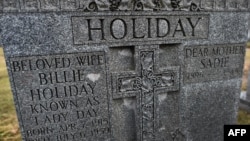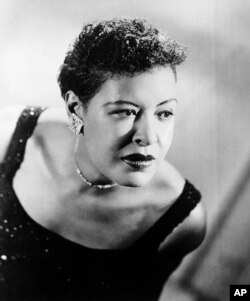The odds were stacked against Eleanora Fagan, who was born to unwed teenage parents in Philadelphia on April 7, 1915. But she would become perhaps the most influential jazz singer ever, Billie Holiday, whose centennial is being celebrated with new albums honoring her legacy.
Unlike Ella Fitzgerald, Holiday lacked the vocal technique that would have gotten her past the early rounds of "American Idol." But nobody did it better when it came to interpreting and plumbing the emotional depths of a song.
Billie Holiday - The Centennial Collection (Columbia/Legacy) offers an excellent introduction to 20 of Holiday's finest recordings from 1935-44.
Holiday likened her voice to a horn, and her inventive phrasing and sense of swing enabled her to seamlessly mesh her vocals with the instrumentals. These recordings pair Holiday with top Swing Era horn players, both white and black, including Benny Goodman, Artie Shaw, Buck Clayton, Ben Webster and notably her musical soulmate, tenor saxophonist Lester Young.
Early years
These early recordings show a more optimistic Holiday in peak voice, playful and flirty on such tunes as "What a Little Moonlight Can Do." Her mood turned darker after tours of the Jim Crow South in the late 1930s, leading to the searing anti-lynching song "Strange Fruit."
The collection concludes with more melancholic recordings from the early 1940s reflecting a greater sense of pain and loss, including the self-penned "God Bless the Child," "Gloomy Sunday" and "Fine and Mellow."
Cassandra Wilson acknowledged Holiday's influence by opening her Grammy-winning 1996 album, New Moon Daughter, with "Strange Fruit." A masterful interpreter of songs, Wilson has released a musical homage, Coming Forth by Day (Legacy), offering a fresh, bold 21st-century take on 11 songs from Holiday's repertoire.
Wilson once again blends jazz with folk, blues, country, R&B and rock influences. Her genre-bending approach is reinforced by involving non-jazz artists - rock and pop producer Nick Launay, best known for his work with Nick Cave; the iconoclastic Van Dyke Parks, who did the lush string arrangements; producer extraordinaire T Bone Burnett, who plays the guitar on several tracks; and drummer Thomas Wydler and bassist Martyn P. Casey of Cave's alt-rock band The Bad Seeds.
Wilson's sultry, smoky vocals are enhanced by the often haunting, ever-changing electro-acoustic sonic backdrops on such tunes as a slowed-down, minor key "All of Me," the sensual "The Way You Look Tonight" and "You Go to My Head" with a sweeping Philly Soul string arrangement.
Reimagining songs
Wilson brings "Strange Fruit" to a rousing climax full of screaming guitars. Her original "Last Song (for Lester)," imagining what a heartbroken Holiday might have sung had she been allowed to perform at Young's funeral, matches her tender vocals with Robby Marshall's mellow tenor sax.
Jose James describes Holiday as his "musical mother." On recent albums, James offered an eclectic mix of R&B, hip-hop, neo-soul, indie rock and jazz. But on Yesterday I Had the Blues: The Music of Billie Holiday (Blue Note), the baritone shows he can be a convincing jazz balladeer, sounding almost like an heir to the laid-back Johnny Hartman.
James is supported by a top-flight rhythm section - with pianist Jason Moran, bassist John Pattitucci and drummer Eric Harland - who respect the tradition while adding modern touches, playing mostly acoustic arrangements that highlight but never overwhelm the vocals.
James performs a male-appropriate selection of nine tunes from the Holiday songbook. He smoothly croons his way through hushed versions of "Good Morning Heartache" and "Tenderly," gets into slow blues grooves on "Fine and Mellow" and "God Bless the Child," and trades briskly paced solos with Moran on the only up-tempo track, "What a Little Moonlight Can Do."
James closes the album with his own dirgelike solo version of "Strange Fruit," punctuated only by occasional hand claps and his own looped and layered voice adding a droning chant, an emotional reminder of the song's relevance today.





